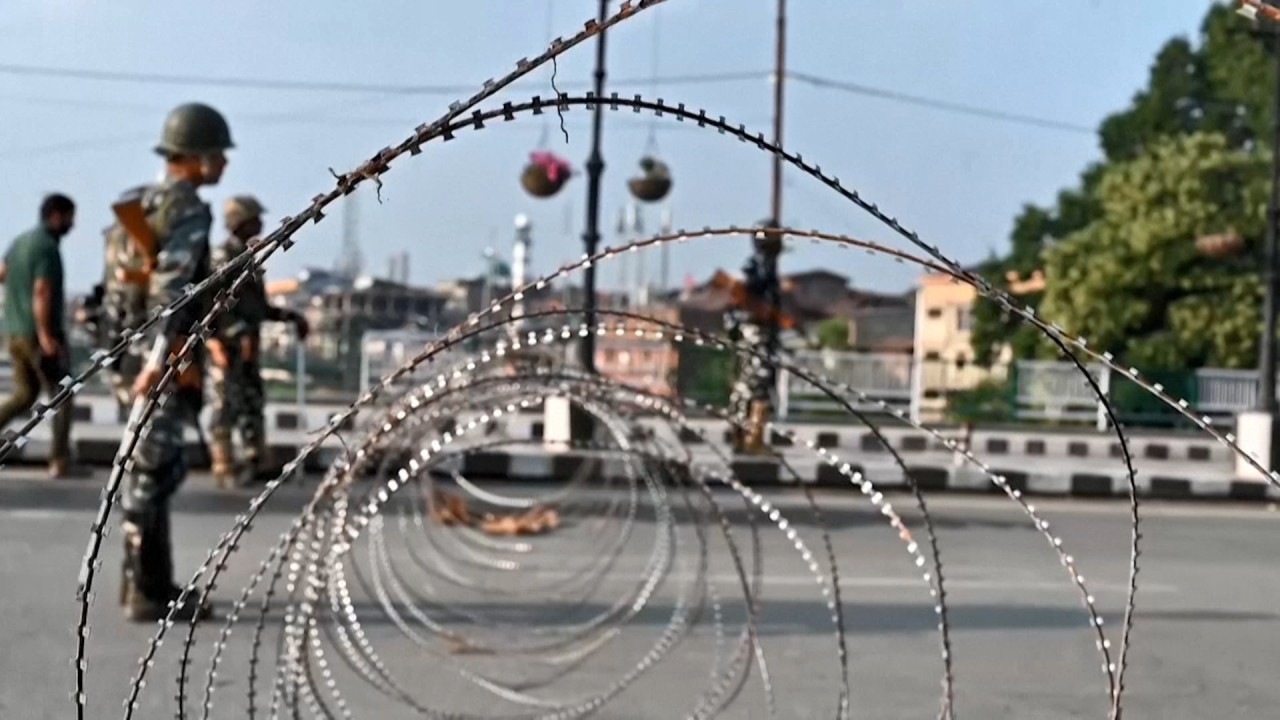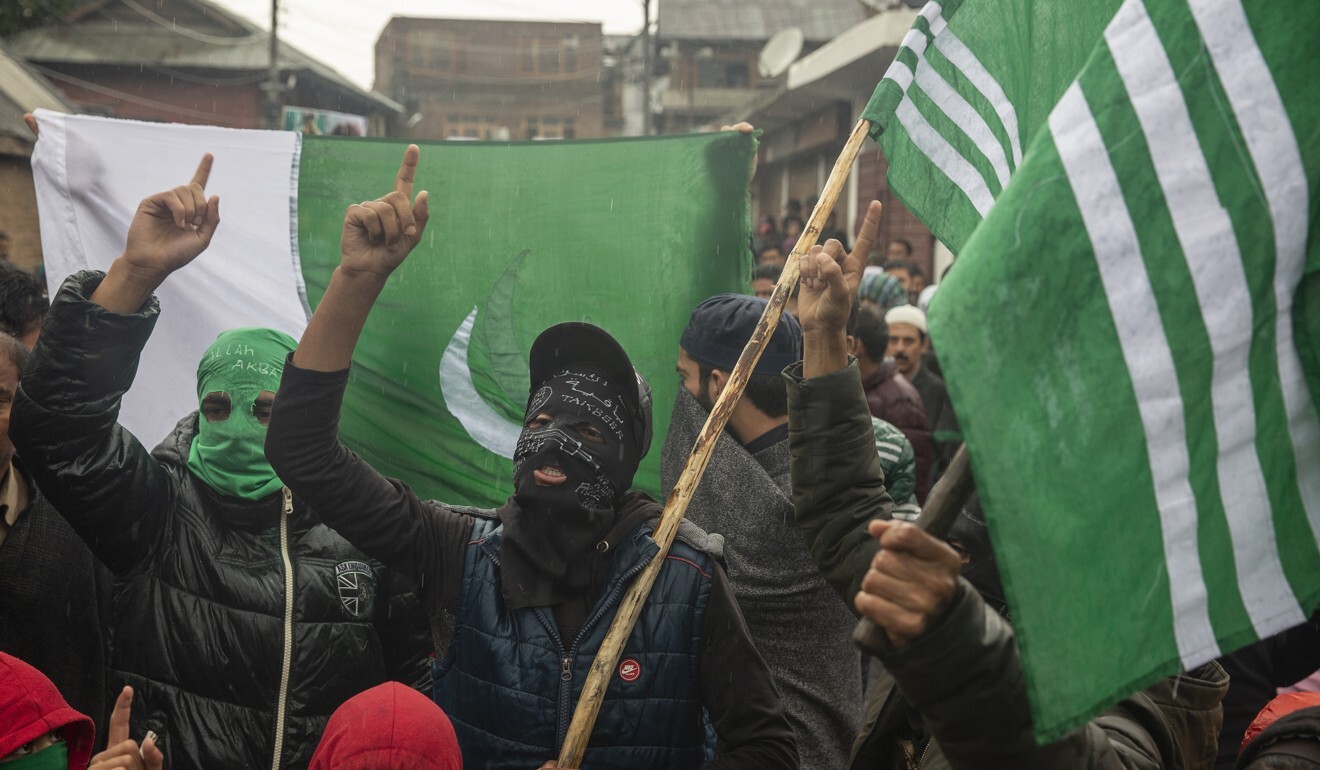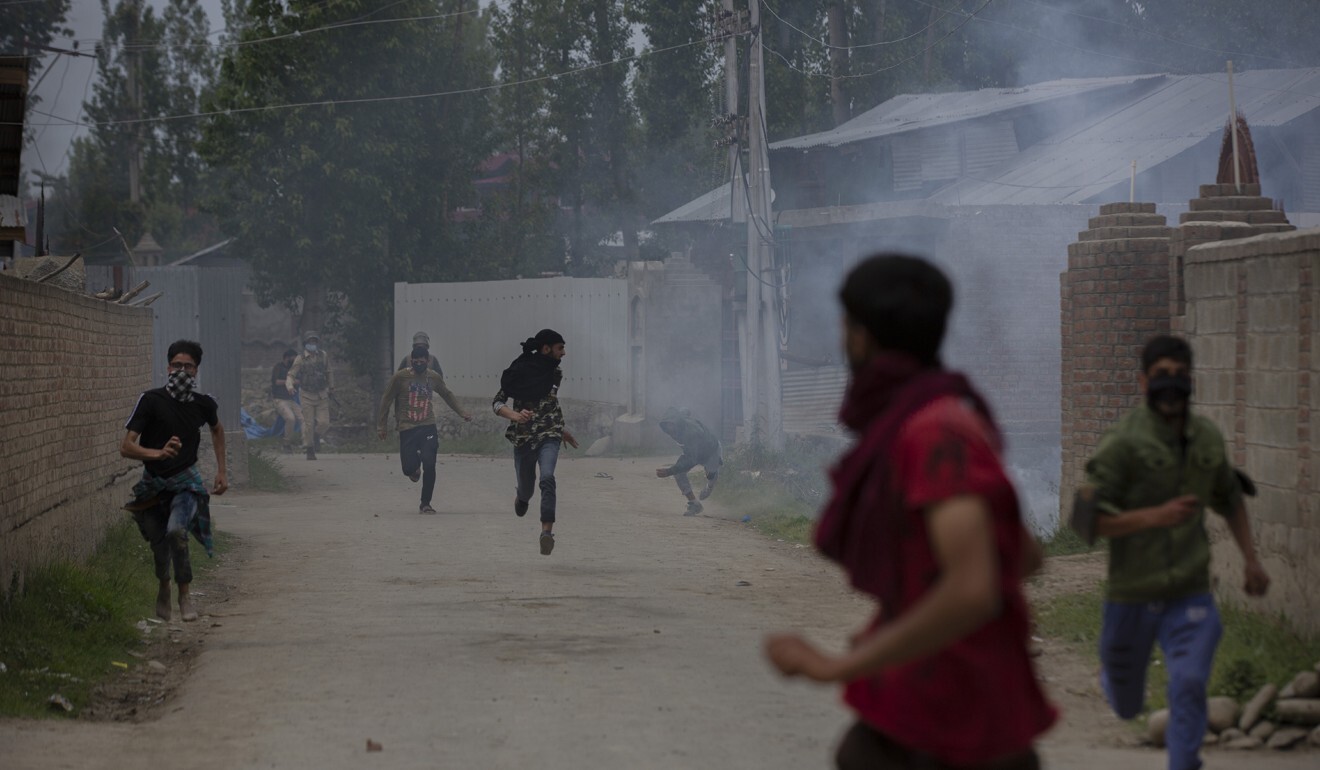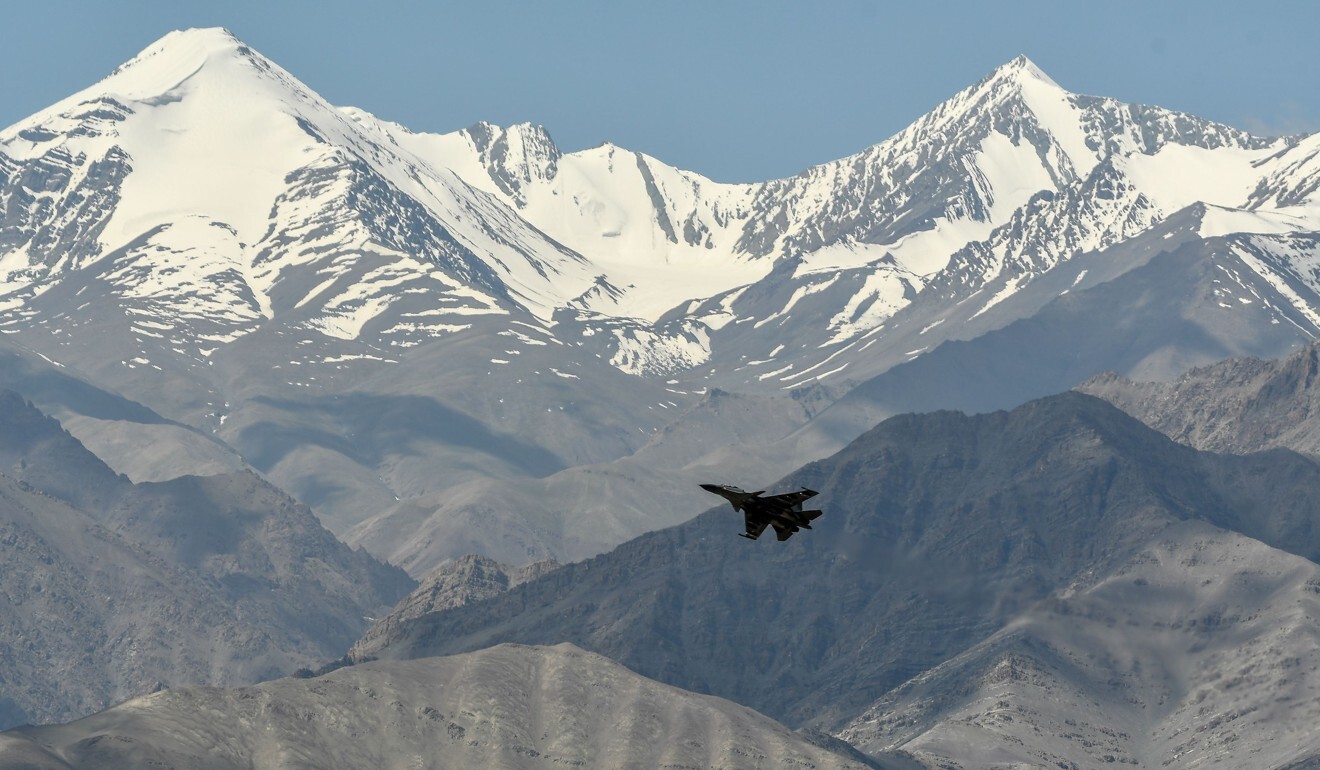
02:29
India revokes Kashmir’s long-held special status, raising opposition from Pakistan and China

As Kashmir marks a year since the Indian government revoked its semi-autonomous status and enforced a crippling security clampdown, calls for self-rule have yet to be extinguished.
Militants in the Muslim-majority area have long bristled against Indian rule, and insurgent activities have continued despite the tightening control.
Indian troops have killed 118 militants between January and July this year, as many as all of last year, local police said. At least 107 of these were local men and youths and their families were banned from attending their funerals, which have in the past proved to be fertile ground for the recruitment of militants.
Conflict scholar Rao Farman Ali of the Institute of Public Policy Research and Development in South Kashmir said the violence carried on as the “aspirational angle” in the uprising remained strong.
“Militancy is not just about numbers of fatalities and violent incidents, it is a state of mind,” he said. “People still aspire to self-rule in an independent Kashmir and cancelling Article 370 is not going to change that.”
Rao was referring to Article 370 of India’s constitution that had given special rights to the former state of Jammu & Kashmir state, home to 12.5 million people, since it became part of independent India in 1947.

02:29
India revokes Kashmir’s long-held special status, raising opposition from Pakistan and China
But the Hindu nationalist government of Prime Minister Narendra Modi on August 5 last year unilaterally abrogated the article, breaking the state into two federal territories – one comprising the Hindu-dominated Jammu region and the Muslim-majority Kashmir valley, known as Jammu & Kashmir, and the second being the Buddhist enclave of Ladakh – to tighten its grip on the restive region.
Pakistan now administers a section of Kashmir but claims it in full, and both countries have fought two of their three wars over the region. After the abrogation, tens of thousands of extra troops were sent into the Kashmir valley, while internet and mobile phone coverage were cut for months. Political leaders were put under house arrest, where they remain detained.
Home minister Amit Shah said New Delhi’s move was necessary to end terrorism, but according to Kashmiris the clampdown was just another way for India to subjugate the region to Hindu rule.
Kashmiri writer and activist Mushtaq Ul Haq Ahmad Sikander said during the security lockdown, militants in hiding told people not to stage protests that risked sparking clashes with Indian forces.
“Their message was don’t get yourself killed to oppose the abrogation, as the decree would not deter [the independence] cause,” he said.
RECEDING TREND?
India has long blamed Pakistan for fuelling militancy in Kashmir, given its claims over the region. Recent blows to two Pakistan-nurtured separatist groups – the resignation of Syed Ali Shah Geelani, a veteran leader of the separatist All Party Hurriyat Conference, as well as the decimation of Hizbul Mujahideen, once Kashmir’s largest jihadist group – have lent some weight to New Delhi’s claims of a receding trend in militancy since last August.
But Rabia Akhtar, director of the Centre for Security, Strategy and Policy Research at the University of Lahore, said there had been a groundswell of local support in Jammu & Kashmir for the anti-India insurgency, and in the future it would not require Pakistan’s “moral or material support”.
Indian security agencies say Pakistani militants are now supporting militancy in Kashmir through new groups with secular-sounding names such as The Resistance Front and JK Pir Panjal Peace Forum, and this is a ploy by Islamabad to evade international sanctions for funding terror groups.
Ayesha Siddiqa of the University of London’s School of Oriental and African Studies, an expert on Pakistan’s military, said the Pakistani army had restrained military groups to evade scrutiny amid impending sanctions for funding terror outfits under the Financial Action Task Force.
“Kashmir is symbolically important for Pakistan and it is too early to give up on the issue,” she said. “There is no sign of totally shutting down proscribed terror groups like Lashkar-e-Taiba and Jaish-e-Mohammed, but they are made to lay low for now.”

Following India’s clampdown on these groups, the number of Kashmiri youths joining them every month has fallen from 14 before last August to five currently, Indian security agencies estimate. Around 24 recruits who joined this year, armed with a small rifle or a pistol, were killed within weeks.
But Subrata Saha, a retired lieutenant general and former deputy chief of the Indian army, said too much focus was put on the militants.
“For every youth picking up a gun, there are 10 Kashmiris lining up to join the military and Indian state security services. Revoking Article 370 is the first step towards finding a political solution to the conflict,” he said, while acknowledging that it will take “a long time”.
Saha said the recent murders of local politicians – Sheikh Waseem Bari from the ruling Bharatiya Janata Party was shot by militants in early July, while Congress leader Ajay Pandita was killed the previous month – were an attempt to prevent the emergence of a pro-India leadership in Kashmir.
India has accused Pakistan of violating ceasefire agreements along their undemarcated border in Kashmir so militants can infiltrate the region. New Delhi says these incidents increased by almost 70 per cent in the first six months of this year compared with the same period last year.
Given that Indian and Chinese troops are locked in a simmering stand-off at several points along their border, the 3,488-km Line of Actual Control, observers are also alleging collusion between Islamabad and Beijing to create a two-front conflict for India to manage.

‘CHINA TAKES OVER LADAKH’
The Indian Army’s recovery of Chinese-made grenades, guns and ammunition from Pakistani militants and Chinese drones in the Kashmir valley in recent years has added to the fears of Beijing’s tacit support of the insurgency.
While China has largely adhered to a policy of formal neutrality on the Kashmir dispute, it has been talking about it more openly, including supporting Pakistan’s bid for a “closed consultation” on Article 370 at the United Nations Security Council last August.
In a now-deleted tweet posted in June, a press officer at the Chinese mission in Islamabad linked the ongoing India-China border stand-off to New Delhi’s unilateral revocation of Kashmir’s special rights, and said the action had “posed a challenge to the sovereignty of China and Pakistan” – further ruffling feathers in India.
A section of Kashmiris are optimistic that China has changed the dynamics of the current conflict over the region. In mid-June, days after the Chinese military ambush that killed 20 Indian soldiers in Galwan valley, “Ladakh Kheow Chenan” – or “China takes over Ladakh” – became a trending topic on social media in Kashmir, with some locals believing that Beijing will push the envelope militarily and work with Islamabad to support the cause of Kashmiri independence.
Ali from the Institute of Public Policy Research and Development said this view was supported by China’s growing presence in the Pakistan-administered section of the region through the Belt and Road Initiative and the China-Pakistan Economic Corridor.
“These infrastructure projects are of strategic rather than economic importance to China, and it needs to take Kashmiris under confidence to entrench its presence further,” he said.

The scholar points out that a decade ago China started issuing stapled visas – which can be torn out, instead of the stamped versions – to the Indian citizens of Jammu & Kashmir and Arunachal Pradesh to imply that it did not recognise New Delhi’s sovereignty over these territories.
“The stapled visa was a kind of message to the Kashmiri leadership to make an outreach with China but it didn’t happen,” Ali said. “Similar opportunities may arise going forward, but because there is no space for political leadership in the valley, the Kashmiri diaspora can play a role and hold talks with China.”
In Pakistan, there has been a flurry of discussions in the think-tank community over India-China relations and the geopolitical implications of the border stand-off. Sherry Rehman, a former Pakistani senator and the current president of the Jinnah Institute, pointed out that New Delhi’s move to directly control Ladakh – which borders Tibet – had triggered the ongoing military confrontation.
Beijing claims Ladakh and last year opposed the move as a bid to undermine its territorial sovereignty.
Akhtar from the University of Lahore agrees that Beijing’s stake in the Kashmir conflict has increased, and it will indeed “make things difficult for India, as far as getting away with its high-handedness in Kashmir is concerned”. However, she ruled out that Pakistan and China would join hands militarily to pin down India.
Kashmiri activist Sikander said the hopes of people living in the valley that Beijing would be a game changer reeked of “desperation and mass thinking of them being under occupation”.
“Kashmiris have looked to India’s adversaries, Pakistan and later the United States, to liberate them,” he said. “China’s actions to safeguard Pakistan’s interests diplomatically doesn’t change the reality on Kashmir’s streets.”
Additional reporting by Reuters